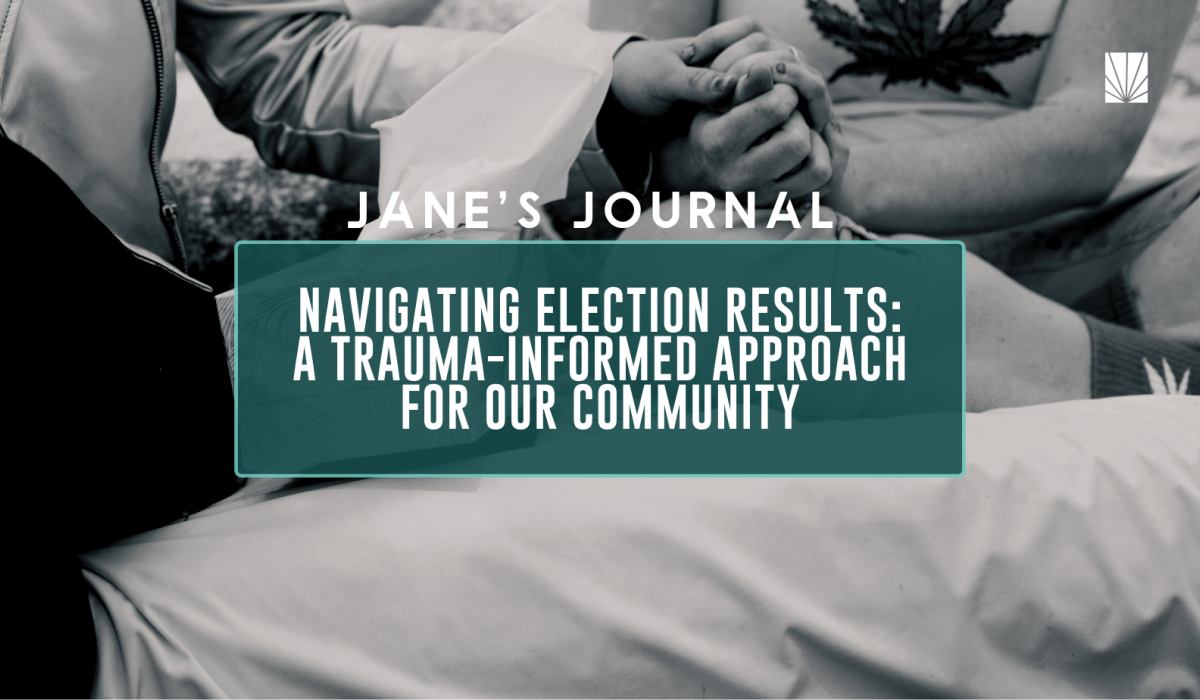
Navigating Election Results: A Trauma-Informed Approach for Our Community
These past months have felt overwhelming, at best and it’s essential to recognize that this election period has been traumatic for many of us. As we process the results, This is Jane Project (TIJP) recognizes that many in our community are likely experiencing heightened emotions and nervous system dysregulation. Stress, relief, anxiety, and even trauma responses can last long beyond November’s results, stretching to the ways in which they will impact members of our community.
Despite our divisive political environment, most of us want the same things– freedom, physical, financial, and psychological health, happiness and the ability to better their own life. As Joy Marino wisely states, “People raised on love see things differently than those raised on survival.” So, as we navigate these tense times, let’s make compassion our baseline and strive to create a community rooted in love and understanding.
As an organization dedicated to you, women and non-binary trauma survivors, we want to offer guidance on how to manage these challenging times in a trauma-aware and sensitive manner.
Acknowledge Your Feelings, Be They Rage, Relief, or Indifference
First and foremost, it’s essential to acknowledge and validate your emotions. Allow yourself to feel whatever comes up for you, whether it’s fear, anger, disappointment, or relief. Each of these feelings are valid and deserve space.
Here’s a common feelings list for those of us who struggle to name our feeling:
- Overwhelmed: Feeling unable to cope with intense emotions or situations.
- Hypervigilant: Constantly on high alert for potential threats or danger.
- Numb: Experiencing emotional detachment or lack of feeling.
- Triggered: Having an intense emotional or physical reaction to a reminder of trauma.
- Dissociated: Feeling disconnected from oneself or one’s surroundings.
- Anxious: Experiencing persistent worry, unease, or fear.
- Ashamed: Feeling deep humiliation or distress, often undeservedly.
- Vulnerable: Sensing a lack of protection or increased susceptibility to harm.
- Angry/Rage: Feeling intense displeasure, often masking underlying hurt or fear.
- Grief: Experiencing deep sorrow or mourning, often related to loss or change.
- Powerless: Feeling a lack of control over one’s circumstances or emotions.
- Distrustful: Having difficulty believing in the reliability or safety of others or situations.
Remember, these feelings are normal responses to abnormal situations, and recognizing them is important in knowing how to respond, instead of react.
Understanding Trauma Responses
It’s important to recognize that trauma can manifest in various ways, especially during politically charged times. As Dr. Asa Don Brown notes, “Childhood trauma doesn’t come in one single package.” This applies to election-related trauma as well. Our responses may be complex and multifaceted.
Micere Keels, a trauma-informed educator, reminds us: “Behavior is the language of trauma. Children will show you before they tell you that they are in distress.” This insight applies to adults too. Be gentle with yourself and others as we navigate this challenging period.
Prioritizing Self-Care and Community Support
During times of stress, self-care becomes even more crucial. This can look different for everyone, but might include:
- Engaging in mindfulness or meditation practices
- Connecting with supportive friends or family
- Limiting exposure to news and social media
- Participating in physical activities you enjoy
TIJP emphasizes the importance of community support – we offer free monthly Healing Happy Hours on the fourth Wednesday of each month, with Janes from across the country joining us on Zoom. Connecting with others who understand your perspective can be incredibly healing.
This month’s HHH will be a grief workshop. Join us for a heartfelt virtual grief circle facilitated by Jen Venegas, the founder of Abeja Rise and a seasoned grief worker, spiritual activist, horticulturist, and death doula. Jen advocates for community care and believes in the importance of collective healing, emphasizing that grief is not something to be fixed but to be walked alongside.
Practicing Trauma-Informed Engagement
When discussing election results, approach conversations from a trauma-informed perspective. By approaching these conversations with empathy, respect, and a genuine desire to understand, we can work towards finding some form of common ground– despite our divisive differences. Remember, the goal is not necessarily to agree on everything, but to foster understanding and maintain civil discourse in our communities.
Tips for Talking About Results with Those You Disagree with include:
- Set Boundaries– as needed to protect your own well-being.
- Validate– that you heard others’ experiences and emotions.
- Pause– oIf dialogue gets heated, it’s okay to pause or come back to a conversation when/if each person feels safe.
- Listen Without Judgment– which we recognize can be incredibly difficult during such politically dividing times.
- Focus on Shared Values and Concerns— Try to identify shared values. As conflict resolution experts suggest, “Try to identify shared values, such as your support of an inclusive society… From there, it can be easier to find areas of common ground.”
An anonymous teacher once shared a powerful insight:
“As Black teachers, we often hide our personal trauma in our effort to help others deal with theirs.”
This reminder applies to all of us – it’s crucial to acknowledge and address our own trauma while supporting others.
Engaging in Trauma-Informed Activism
If you feel called to take action, consider engaging in trauma-informed activism. This might involve supporting organizations that align with your values, participating in community service, or advocating for causes you believe in.
Remember, though, pace yourself and prioritize YOUR well-being throughout the process.

In Closing
Remember, you are not alone.
We are all Janes, and together, we can move forward in a healing and trauma-sensitive way, regardless of this election outcome. And, while that healing will likely look different for those of us with differing beliefs, everyone is welcome here.
In all ways. Always.
For those who could benefit from crisis support please dial 988. Real-time support is available.
In Healing,
This is Jane Project Team
election reactions, healing from trauma, this is jane project, trauma survivor
